外研版2017年中考一轮教材复习课件:七年级下册 Modules 10-12
文档属性
| 名称 | 外研版2017年中考一轮教材复习课件:七年级下册 Modules 10-12 | 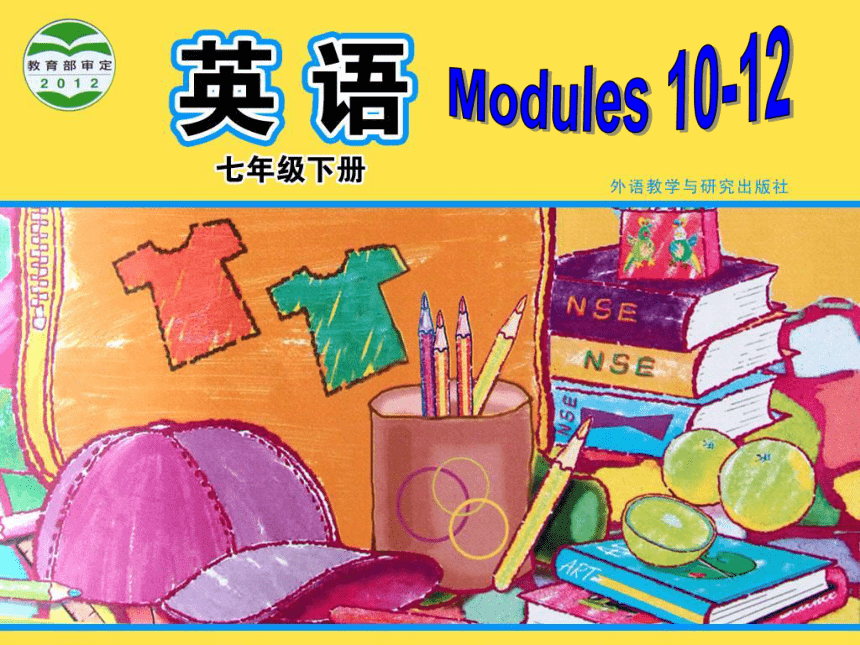 | |
| 格式 | zip | ||
| 文件大小 | 381.8KB | ||
| 资源类型 | 教案 | ||
| 版本资源 | 外研版 | ||
| 科目 | 英语 | ||
| 更新时间 | 2017-01-25 16:27:31 | ||
图片预览

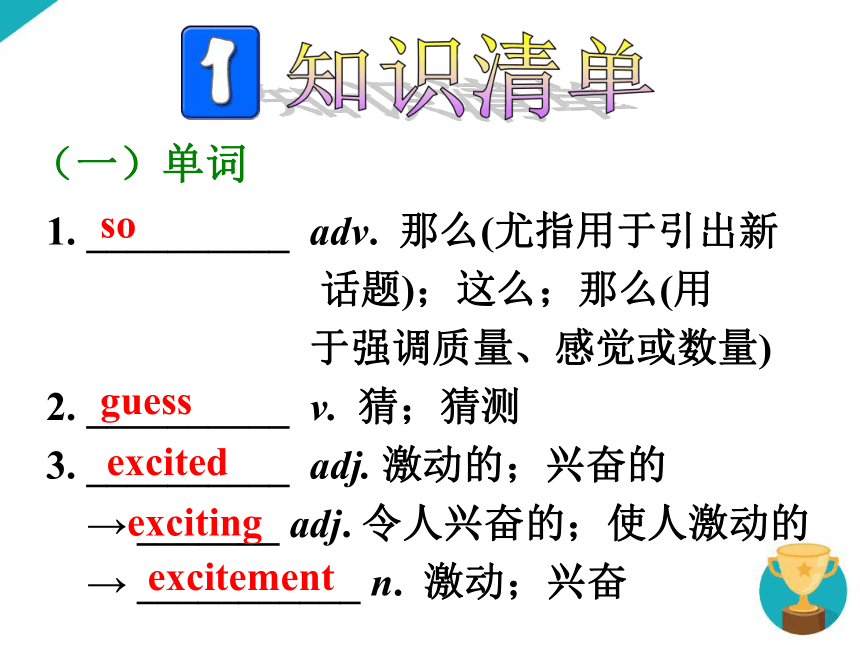
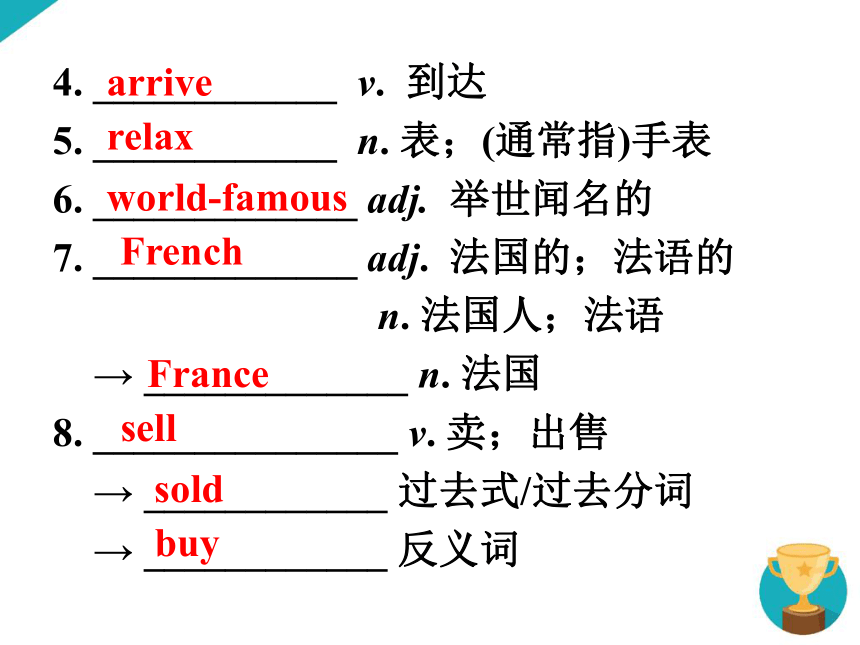
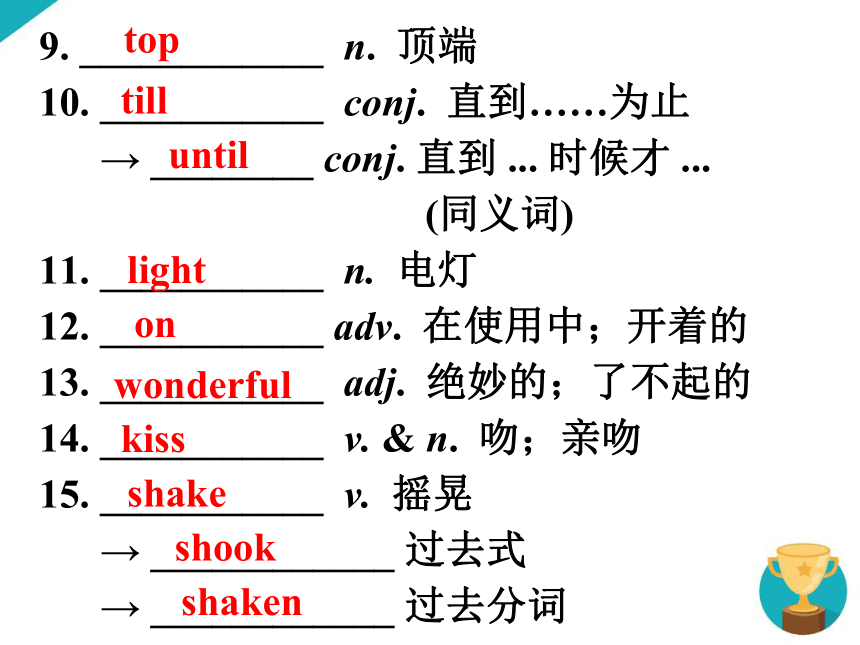
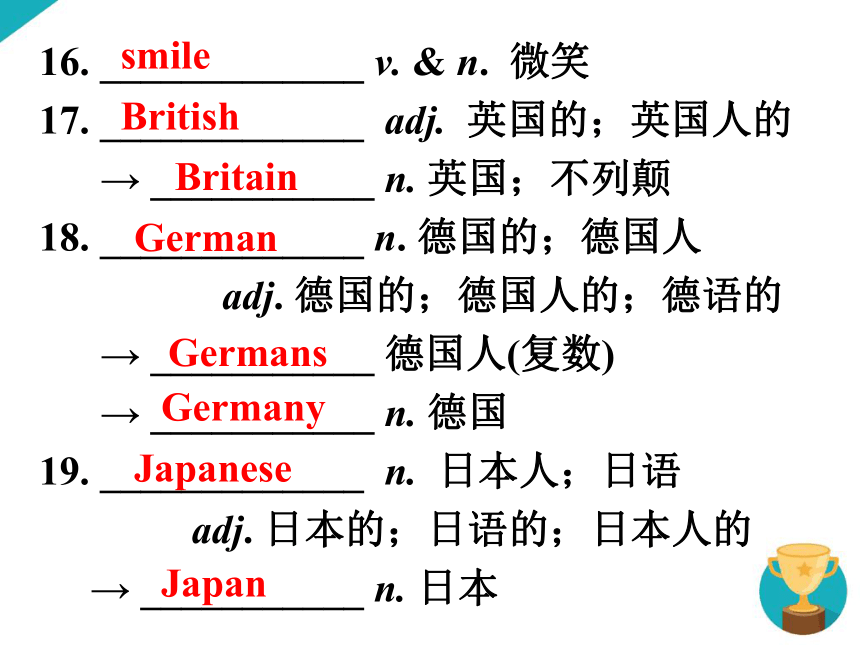
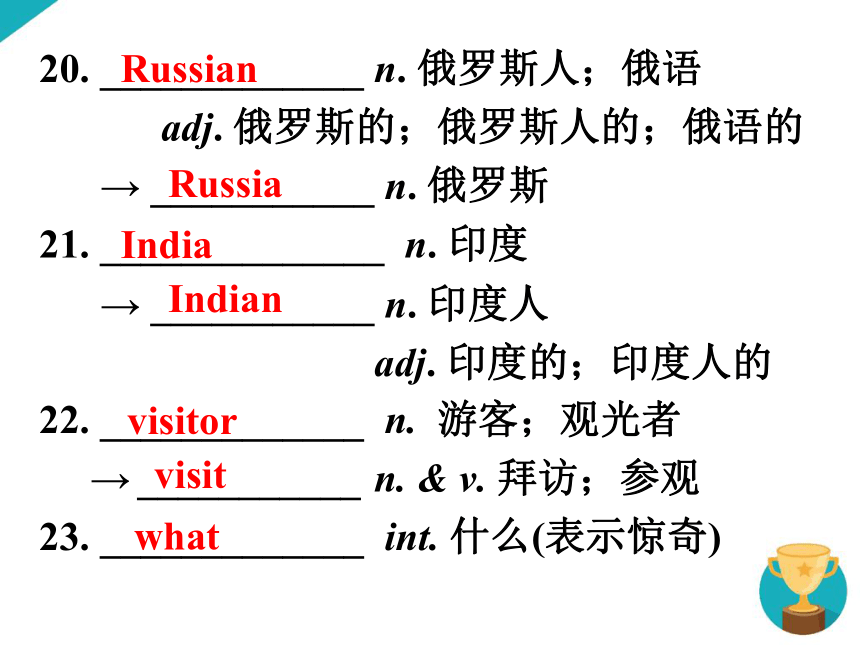
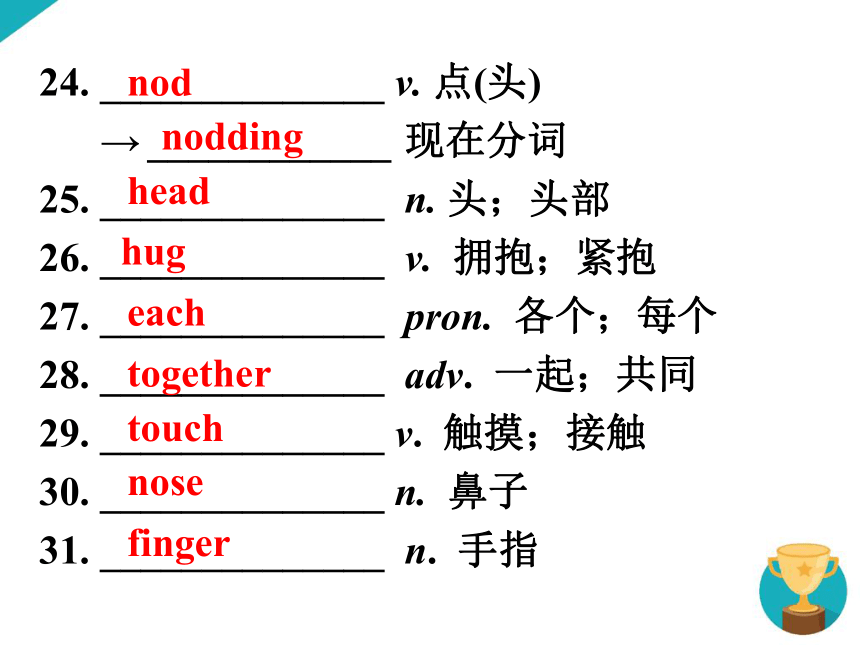
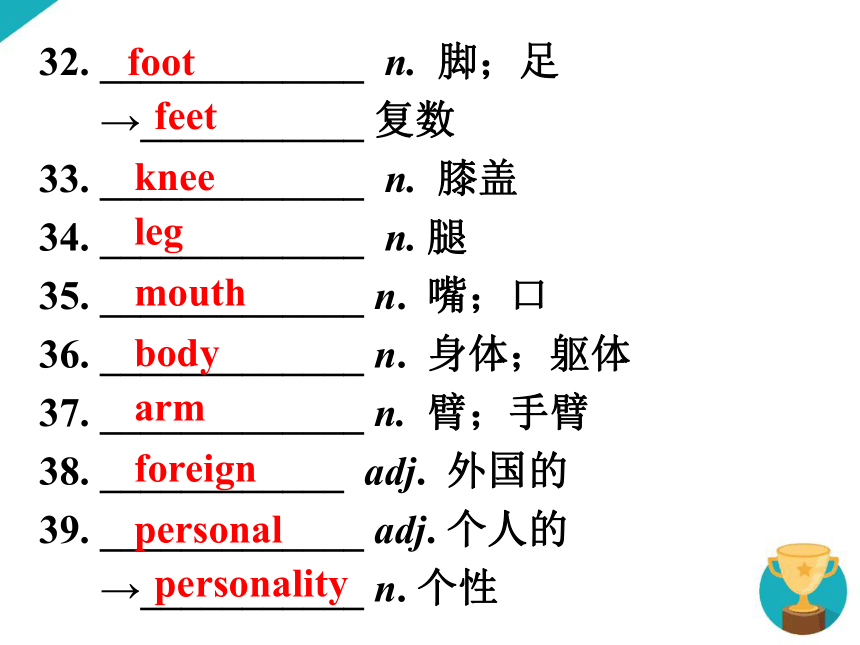
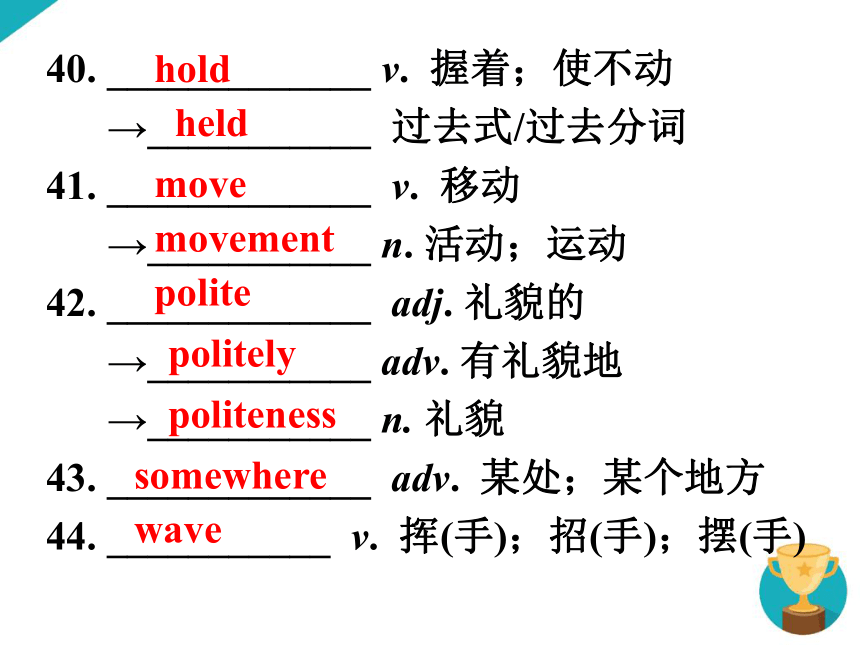
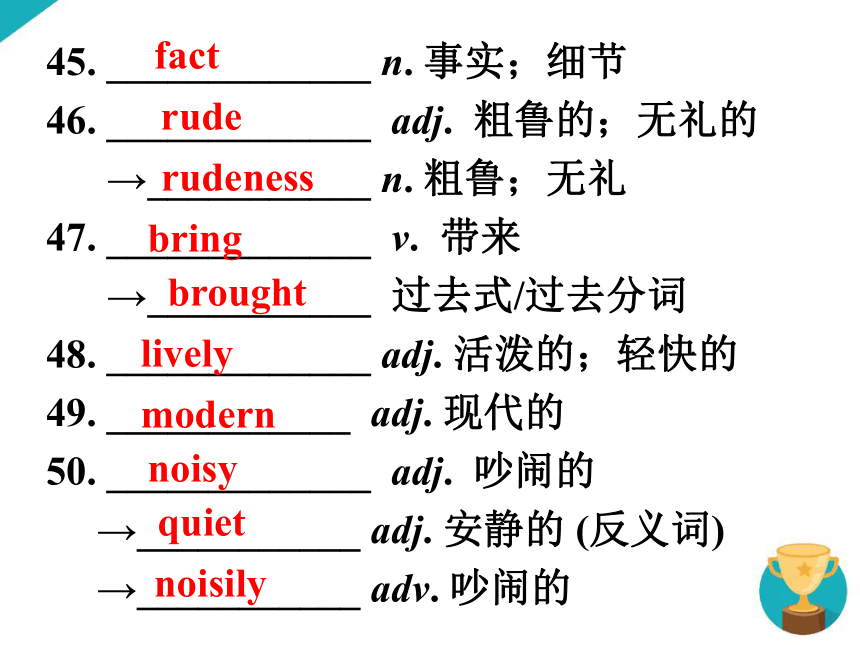
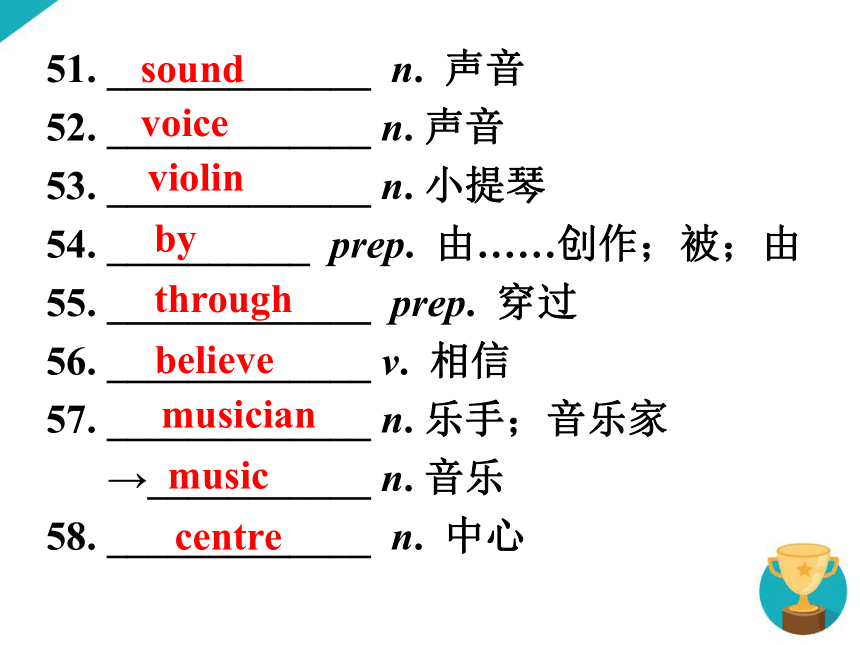
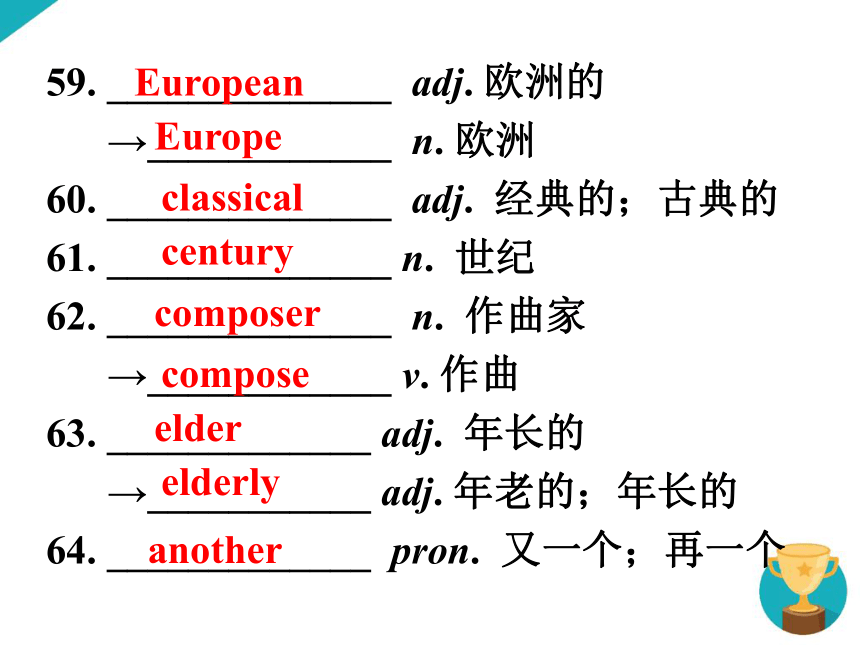
文档简介
课件98张PPT。Modules 10-121. __________ adv. 那么(尤指用于引出新
话题);这么;那么(用
于强调质量、感觉或数量)
2. __________ v. 猜;猜测
3. __________ adj. 激动的;兴奋的
→ _______ adj. 令人兴奋的;使人激动的
→ ___________ n. 激动;兴奋知识清单(一)单词soguessexcitingexcitedexcitement4. ____________ v. 到达
5. ____________ n. 表;(通常指)手表
6. _____________ adj. 举世闻名的
7. _____________ adj. 法国的;法语的
n. 法国人;法语
→ _____________ n. 法国
8. _______________ v. 卖;出售
→ ____________ 过去式/过去分词
→ ____________ 反义词arriverelaxFrenchworld-famousFrancesellsoldbuy9. ____________ n. 顶端
10. ___________ conj. 直到……为止
→ ________ conj. 直到 ... 时候才 ...
(同义词)
11. ___________ n. 电灯
12. ___________ adv. 在使用中;开着的
13. ___________ adj. 绝妙的;了不起的
14. ___________ v. & n. 吻;亲吻
15. ___________ v. 摇晃
→ ____________ 过去式
→ ____________ 过去分词 topuntillightontillwonderfulkissshakeshookshaken16. _____________ v. & n. 微笑
17. _____________ adj. 英国的;英国人的
→ ___________ n. 英国;不列颠
18. _____________ n. 德国的;德国人
adj. 德国的;德国人的;德语的
→ ___________ 德国人(复数)
→ ___________ n. 德国
19. _____________ n. 日本人;日语
adj. 日本的;日语的;日本人的
→ ___________ n. 日本smileBritishBritainGermanGermanyGermansJapaneseJapan20. _____________ n. 俄罗斯人;俄语
adj. 俄罗斯的;俄罗斯人的;俄语的
→ ___________ n. 俄罗斯
21. ______________ n. 印度
→ ___________ n. 印度人
adj. 印度的;印度人的
22. _____________ n. 游客;观光者
→ ___________ n. & v. 拜访;参观
23. _____________ int. 什么(表示惊奇)RussianRussiaIndiaIndianvisitvisitorwhat24. ______________ v. 点(头)
→ ____________ 现在分词
25. ______________ n. 头;头部
26. ______________ v. 拥抱;紧抱
27. ______________ pron. 各个;每个
28. ______________ adv. 一起;共同
29. ______________ v. 触摸;接触
30. ______________ n. 鼻子
31. ______________ n. 手指nodnoddingheadhugeachtogethertouchnosefinger32. _____________ n. 脚;足
→___________ 复数
33. _____________ n. 膝盖
34. _____________ n. 腿
35. _____________ n. 嘴;口
36. _____________ n. 身体;躯体
37. _____________ n. 臂;手臂
38. ____________ adj. 外国的
39. _____________ adj. 个人的
→___________ n. 个性footkneebodylegmouthfeetforeignpersonalpersonalityarm40. _____________ v. 握着;使不动
→___________ 过去式/过去分词
41. _____________ v. 移动
→___________ n. 活动;运动
42. _____________ adj. 礼貌的
→___________ adv. 有礼貌地
→___________ n. 礼貌
43. _____________ adv. 某处;某个地方
44. ___________ v. 挥(手);招(手);摆(手)holdheldmovepolitelypolitenessmovementpolitesomewherewave45. _____________ n. 事实;细节
46. _____________ adj. 粗鲁的;无礼的
→___________ n. 粗鲁;无礼
47. _____________ v. 带来
→___________ 过去式/过去分词
48. _____________ adj. 活泼的;轻快的
49. ____________ adj. 现代的
50. _____________ adj. 吵闹的
→___________ adj. 安静的 (反义词)
→___________ adv. 吵闹的bringbroughtlivelymodernfactruderudenessnoisynoisily?quiet 51. _____________ n. 声音
52. _____________ n. 声音
53. _____________ n. 小提琴
54. __________ prep. 由……创作;被;由
55. _____________ prep. 穿过
56. _____________ v. 相信
57. _____________ n. 乐手;音乐家
→___________ n. 音乐
58. _____________ n. 中心byvoicebelievemusiciansoundviolinmusiccentrethrough59. ______________ adj. 欧洲的
→____________ n. 欧洲
60. ______________ adj. 经典的;古典的
61. ______________ n. 世纪
62. ______________ n. 作曲家
→____________ v. 作曲
63. _____________ adj. 年长的
→___________ adj. 年老的;年长的
64. _____________ pron. 又一个;再一个centurycomposercomposeelderlyEuropeanEuropeclassicalanotherelder65. _____________ adj. 贫穷的
→___________ (反义词)
66. _____________ adj. 完美的
→___________ adv. 完美地
67. _______ adj. 令人悲伤的;令人难过的
→___________ adv. 悲伤地
→___________ n. 悲哀
→___________ (反义词)
richperfectperfectlysadnesspoorsadlysadhappy1. __________________?臂挽臂地? ? ??
2. __________________??在机场?????
3. __________________?小心????????
4. __________________??和某人在一起
5. __________________?京剧????
6. __________________?身势语?????
7. __________________?舞曲????
8. __________________?购物
9. __________________??开车带某人到……(二)短语arm in arm?? ? ??
at the airport???????
be careful?????????
be with sb.??
Beijing opera?????
body language??????
dance music?????
do some shopping?
drive sb. to ...???10. ______________________?互相;彼此
11. ______________________?事实上
12. ______________________??在18世纪
13. ______________________?听???
14. ______________________ 走开
15. ______________________?北美人
16. ______________________?一点也不?
17. ______________________??度假
18. ______________________?个人空间
19. ______________________??流行音乐each other?
in fact?
in the eighteenth century???
listen to????????????????????
move away
North American?
not at all?
on holiday??
personal space?
pop music??20. ______________________??摇滚乐??????
21. ______________________?握手
22. ______________________?南美人
23. ______________________?散步
24. __________________ ……的首都(城市)
25. _______________________??前天
26. _______________________??太平洋
27. ________________________
西方传统音乐rock music???????
shake hands?
South American?
take a walk?
the capital (city) of ...?
the day before yesterday??
the Pacific Ocean??
traditional Western music??28. ___________________??排队等候
29. ___________________?挥手说再见
30. ___________________??艺术品wait in line?
wave to say goodbye?
works of art??1. Where are you going on holiday ...?
2. How long did it take to get there?
3. ... guess what?
4. It was great!
5. They sell such good fruit and vegetables.
6. I hope you'll like it!
7. We waited till all the lights were on.
8. How do I do that?
9. No, I didn't know that.(三 )句型 10. That's because people do different things in different countries.
11. What do they do?
12. How about touching people?
13. In some places, it isn't polite to look at people when you talk ...
14. ... this is Western music, isn't it?
15. It's so beautiful!
16. I'm not sure ...
17. What a beautiful city!18. Do you like traditional Western music or pop music ...?
19. Give us a break!
20. You don't like rock music?
21. I don't believe it!
22. His dance music made him famous all over?Europe.
23. Before he was six, he played not only the piano but also the violin.(四) 交际用语 一、提醒注意(Reminding)
Don't stand too close to North Americans.
Give them more personal space.
No smoking!
Be careful!
Don't touch!
It's dangerous!二、肯定和不肯定(Certainty and uncertainty)
I'm sure.
I'm sure of that.
I'm (quite) sure (that) she'll join us.
I'm not sure.
I'm not sure of that.
I'm not sure whether / if she can come.
Maybe you're right.
Perhaps she is at home now.三、高兴(Happiness)
How wonderful / nice!
That's lovely / great / wonderful!
I'm so happy.
四、满意(Satisfaction)
Good!
Well done!
Perfect!
That's fine!
That's better.1. excited adj. 激动的;兴奋的核心要点(一)单词excited exciting 2. arrive v. 到达归纳
arrive in+相对较大的地方
arrive in Beijing
arrive at+相对较小的地方
arrive?at the station get是不及物动词。?
get to 到达,后面可直接跟地点名词。
reach是及物动词,其后可以直接跟宾语。
当get, arrive后面接here, there, home等表示地点的副词时,应省略介词。
e.g. She often arrives home at 7:30 in the
evening. get reach arrive请根据句意选用arrive, get 或reach填空。
1. When will your uncle _______?
2. I usually ______________________ school at seven o’clock.
3. We’ll ______________________?Hong Kong?soon.
4. When do you usually _________________________ your office?arrive?get to / arrive at / reach??get to / arrive in / reachget to / arrive at / reach 3. relax v. 放松归纳
relax at home 在家休息
relax oneself 放松自己拓展
relaxed?adj.? 轻松的;随意的
(用来形容人的感受)
relaxing?adj.? 令人轻松的
(用来形容事物的特征)
relaxation?n.? 放松;娱乐;娱乐活动用relax, relaxing或relaxed填空。
1. They are _________ when they see the movie.
2. I like listening to __________ music.
3. Playing computer games can ______ me.
4. The TV show is very __________. All of us like watching it.relaxed?relaxingrelax?relaxing 4. French n. 法语
German adj. 德国的;德语的;德国人的
n. 德国人;德语
Russian n. 俄罗斯人;俄语
adj. 俄罗斯的;俄罗斯人的;俄语的归纳
Frenchman 法国人
Frenchmen 法国人(复数)
France n. 法国Germans 德国人(复数)
Germany n. 德国
Russia n. 俄罗斯
Russians n. 俄罗斯人(复数) 拓展
表示“某国人”的名词变复数形式一般可直接加-s。
American Americans 美国人
Australian Australians 澳大利亚人
Canadian Canadians 加拿大人以-ese结尾的表示“某国人”的名词是单复数同形。
e.g. Chinese 中国人
Japanese 日本人-- Are all the students from ____ in your class?
-- No, there are only 3 ____ in our class. The others are from other countries. (2015眉山)
A. Germany; Germen
B. Germany; Germans
C. German; Germans
D. German; Germany B 5. sell v. 卖;出售sell可直接跟宾语,还可跟双宾语。
sell sb. sth. / sell sth. to sb.。
e.g. Tom?sold?Mary his bike. / Tom?sold?his
bike to Mary.
sale是名词,常用词组有for sale (待售);on
sale (在出售;打折出售)。sell sale6. till conj. 直到……为止(时间上/程度上)归纳
till通常可以与until互换,但until较为正
式。
1) till用于肯定句中时,句子的谓语动词是延续性的,表示动作一直到till后的那个时间才结束;
2) till用于否定句时,句子的谓语动词是非延续性的,表示动作直到till后的那个时间才开始。 7. smile v. & n. 微笑归纳
with a smile 带着笑容
smile at 向……微笑8. nod v. 点头归纳
nod one’s head 点头
nod sb. a welcome 向某人点头表示欢迎
nod sb. back 点头示意某人回来
nod one’s farewell 点头告别9. each pron. 各个;每个each every根据句意用each或every填空。
1. _____________ room is clean.
2. There are many trees on ________ side of the road.
3. ________ of the boys can play soccer.?Every / Eacheach?Each 10. hold v. 握着;使不动归纳
hold on 坚持;不要挂断电话;
抓住,保持
hold up 举起;耽搁
hold your tongue? 住嘴;不(要)说话
hold one’s breath?屏住呼吸;极其紧张;
提心吊胆11. bring v. 带来;取来bring take ?fetch carry bring常指“(从别处向说话者或被提到的人所在的地方)带来;拿来”。
take常指“(从说话者或被提到的人所在的地方向别处)带走;拿走”。
fetch常指“去拿来”,是一个往返的过程。
carry常指“搬运;提;扛”,不强调方向。根据句意,用bring, take, fetch或carry的适
当形式填空。
1. Please go into the room and ________ me my raincoat. It’s raining outside.
2. Look! The robot is _________ those heavy things.
3. If you go to?Shanghai, please _________ some clothes to my daughter.
4. Remember to _________ your dictionary here tomorrow.fetch?carrying?take?bring 12. lively adj. 活泼的;轻快的lively alive living请根据句意用lively, living或alive填空,每词
限用一次。
1. He is believed to be one of the best ________ artists.
2. Mary is such a(n) ________ girl that we all like her.
3. Mr Zhu must be ________, for he is still breathing slightly.
??livinglively?alive 13. noisy adj. 吵闹的拓展
noise n. 声音;噪音
noisily adv. 吵闹地
make (a) noise 制造噪声I live in a (an) _____ neighborhood. Many people and cars come and go very often. (2015长春)
A. quiet B. empty C. noisy D. lonelyC14. sound n. 声音sound noise voice15. through prep. 穿过through为介词,表示“从……内部穿过”,往往指穿过沙漠、森林,(光线)透过窗户等。
cross表示穿过,相当于go across。
across为介词,表示“从……表面穿过”,或“横穿”。
across from 在……对面through cross across over pastover为介词,意为“翻越”,表示到达高的障碍物(如树、墙、篱笆和山脉等)的另一侧。
past为介词,意为“走过,经过”,指从某特或某人旁边经过。
walk/ go past (=pass)You must be careful when you swim ____ the lake. (2015潍坊)
A. across B. below C. over D. throughA16. both pron. 两个;两者
conj. ……和……都 归纳
both of 后接名词、代词,名词前常有the, my, his等词。
both…and … …….和……都 ……
连接两个并列的成分。
它连接两个并列主语时,谓语动词用复数数形式。
e.g. Both you?and?I are students. 17. elder adj. 年长的elder older18. another pron. 又一个;再一个another, other, the other, others, the others another, other, the other, others和the
others?都有“另外的”意思。
★another意思是“再一;另一”,指三者或三者以上中的另一(事物或人)。
★other意为“另外的、其他的” ,通常作定语,常与复数名词连用。★the other?意思是“两者中的另一个”,常与one连用,构成one ..., the other ...结构。
★others泛指别的人或物(但不是全部),不能作定语,常构成some ..., others ...结构。
★the others是?the other?的复数形式,指其余所有的人或物。根据句意,选用other, the other, others, the
others?或?another填空。
1. I have two pencil cases. One is white, ___________ is pink.
2. Do you have any ________ ideas?
3. There are six students in the classroom. Where are ___________?
4. Some people came by car, _________ came by bus. A few came on foot.
5. I lost my pen, so I bought _________ one.the otherother?the others?othersanother 19. poor adj. 贫穷的归纳
be poor in 在……方面贫乏
be rich in 在……方向富裕
拓展
the poor 穷人
作主语时,谓语动词用复数。
e.g. The poor are not always sad.(二)短语1. arm in arm ?臂挽臂地拓展
foot by foot 一步一步地
heart to heart 心连心
neck and neck 齐头并进
shoulder to shoulder 肩并肩
face to face 面对面
head to head 交头接耳
hand in hand 手拉手2. move away ?走开 拓展
take away 拿走
run away 逃跑
get away 走开
cut away ? 切除? ?? ?
fly away 飞走?
put away 把……放好
go away? 离开 3. on holiday ? 在度假 (表示一种状态)拓展
for a holiday 去度假
have/ take / spend a holiday 度假 (动词短语)
a holiday of several days /
several days’ holiday 几天的假期(三)句式1. How long did it take to get there?how long表示“时间上要用多久”,它也可以表示“长度上有多长”。
e.g. How long is the Great Wall?
take当“花费”讲时,通常表示“花费时间”。
It takes/ took sb. some time to do sth.
e.g. It takes me one hour to do my
homework every day.-- How long does it _____ to get to the station by taxi?
-- About an hour. (2015济南)
A. use B. have C. take D. spendC2. It has many world-famous works of art, such as the Mona Lisa.
such as 例如
用来列举同类人或事物中的几个例子,通常以词或短语的形式举例。
for example 例如
通常以某事为例,以句子的形式进行列举;作插入语时,用逗号与其他句子成分隔开,可置于句首、句中或句末。3. They sell such good fruit and vegetables.
such adj. 如此的,这样的
修饰名词或名词短语。
such + a/ an + adj. + 可数名词单数
such + adj. + 可数名词复数4. That’s because people do different things in different countries.
That’s because… 那是因为……
后接表示原因的句子。
that’s why 那是为什么 ……
后接表示结果的句子。
e.g. That’s because I didn’t know about it.
That’s why he came late.5. How about touching people?
What / How about …
……怎么样?
用来征求别人的意见、询问天气(身体)等情况或提出建议。
What/How about后可接名词或代词,接代词时要用宾格形式。
What/How about后接动词时,须用v-ing形式。6. I’m not sure…
当对某事不确定时,可以用I’m not sure.
be sure of/ about
be sure + that引导的从句
be sure to do sth. 务必
make sure 确保;查明7. His dance music made him famous all over Europe.
make sb. / sth. Do sth.
使某人/物做某事
make sb. / sth. + adj. 使某人/物……
e.g. The music made us relaxed.
The boss made him work for 12 hours.语法祈使句 (Module 11)
祈使句常用来表示请求、命令、劝告、
号召、禁止等。肯定式
1.?以动词原形开头。此类祈使句的主语一般是第二人称you,但往往省略,句末通常用句号或感叹号。如:
Stand up. Be quiet, please!
2.?以let's开头。如:
Let's go now.否定式
1. Don't+动词原形。如:
Don't swim in this river.
2. Let's + not+动词原形。如:
Let's not say anything about it.温馨提示:
◆“No+动词-ing?形式?/?可数名词的复数形式”可表示“禁止做某事”。如:
No smoking!
No photos!
◆“祈使句+and / or+分句”结构中,祈使句具有条件句的含义。如:
Push the door hard(,) and it will open.
=If you push the door hard, it will open.感叹句 (Module 12)
感叹句是用来表达喜、怒、哀、乐等强烈情感的句子。到目前为止,我们学习的感叹句有两类:
第一类就是陈述句句末加感叹号表示强烈的语气;
第二类是由what或how引导。下面重点复习第二类。what引导的感叹句的常见结构如下:
1. What+a/an+形容词+可数名词单数形式(+主语+谓语)!?如:
What a clever boy (Kim is)!
What an honest man (he is)!
2. What+形容词+可数名词复数形式(+主语+谓语)!?如:
What big apples (they are)!
3. What+形容词+不可数名词(+主语+谓语)!?如:
What fine weather (it is)!how引导的感叹句的常见结构如下:
How+形容词?/?副词(+主语+谓语)!?如:
How important (the information is)!
How fast (he runs)!
温馨提示:一般情况下,由what和how引导的感叹句可以相互转换,转换后意义不变。如:
What a beautiful city it is! = How beautiful the city is!?将下列汉语句子翻译成英语。
1.?别关门!
2.?请喝些水!
3.?咱们在动物园拍照吧!
4.?上课别迟到!
5.?禁止停车!Don't close the door!Please drink some water!Let's take photos in the zoo!Don't be late for class!?No parking!?完成下列感叹句。
1. _______ thin girl she is!
2. _______ well Mary dances!
3. _______ expensive clothes they are!
4. _________ interesting book he is reading!
5. _______ strong this boy is!What a?How?What?What an?How1. ________ kind and helpful to the people around us, and we will make the world a nicer place to live in. ?(2015?河南)
A. Be?? ? B. Being? ?????C. To be ? ? ?D. Been
2. ____ on the grass, or it will “cry”. ?(2015?陕西)
A. To walk ? ? ? ? ? ? ? ?B. Not to walk
C. Walk ? ? ? ? ? ? ? ? ? ?D. Don't walk中考链接AD3. Daniel, ________ play with the mobile phone while you're walking in the street.??(2015?江苏盐城)
A. don't ? ? ? ? ? ? ? ? ? B. doesn't??????
C. won't ? ? ? ? ? ? ? ? ?D. can't
4. ________ along this street, and you can find the hotel on your right, next to the market. (2015?吉林长春)
A. Walk??????? ??????????? B. To walk?????
C. Walks ? ? ? ? ? ? ? ? D. WalkingAA5. Guan Dong saved an old lady out of the?Yangtze River. ________ great courage he showed! ?(2015?江苏苏州)
A. What a???????????????????? B. What??
C. How a ? ? ? ? ? ? ? ? ? ? ?D. How
6. _____ great fun we had in?Yandu?
Park?last Sunday!???(2015?江苏盐城)
A. How??????????????????????? B. What? ?????
C. What a ? ? ? ? ? ? ? ? ? D. How aBB7. ________ terrible news! Three of us didn't pass the exam. ?(2015?湖南衡阳)
A. What? ?????B. How ? C. What a
8. —Jane Zhang is going to hold a concert here in July.
—Really? ________ exciting news! (2015?湖南长沙)
A. How ???????B. What an??? C. What?ACⅠ.?根据语境从方框中选择恰当的单词填
空,有的需要变换形式。?
1. I asked him if he would come to my party and he ________.
2. There is a bird standing on the ________ of the building.strange巩固练习nodded?polite, together, hold, nod, visitor,
lively, violin, poor, top, hugtop?3. The beach is so nice. Many ________ come here every day.
4. Don't shout at the old man. It's not ________.
5. Mrs White ________ her son when they met at the airport.
6. We love Miss Smith because her class is ________.polite, together, hold, nod, visitor,
lively, violin, poor, top, hugvisitorspolitehugged?lively?7. After breakfast, Jane and Jenny go to the Music Club ________.
8. Bob can play the ________, but he can't play football.
9. Jack ________ a basketball and ran into the classroom.
10. Kate is ________ and she has no money to buy food.polite, together, hold, nod, visitor,
lively, violin, poor, top, hugtogether?violin?held?poorⅡ.?根据语境及所给首字母提示补全所缺单词。
1. I don't like this coat. Please show me a_______ one.
2. We will wait here t_______ you come back.
3. I can't find my pen. Maybe I left it s___________.
4. Gina has a beautiful v_______, and we all like her songs.another?till?somewhere?voice?5. It's too n_______ here. Let's find a quiet place.
6. That store s_______ different kinds of school things. You can buy anything you want there.??
7. Lucy f_______ very sad when she heard the bad news.?
8. That's a beautiful city. You can come and r_______ during your holidays.noisy?sells?felt?relax?9. The lights in the office are o_______. Some people are still working there.
10. Dad, please b_______ my pencil here. I need it.on?bringⅢ.?根据句意从方框中选择恰当的短语填空,有的需要变换形式。
1. We usually ________________ when we meet.
2. ________________ don't like talking on the bus.
3. ___________,?Alice?is an English girl.body language, in fact, shake hands, dance music,
the day before yesterday, North American,
wave to say goodbye, personal spaceshake handsNorth Americans?In fact?4. The ________________ sounds very excellent.
5. Nick went to the farm ________________________.
6. The girl ______________________ to her parents at the airport just now.body language, in fact, shake hands, dance music,
the day before yesterday, North American,
wave to say goodbye, personal spacedance musicthe day before yesterday?waved to say goodbye?7. ________________ is not the same in different countries.
8. We should give? children more ________________.?body language, in fact, shake hands,
dance music,
the day before yesterday, North American,
wave to say goodbye, personal spaceBody language?personal space ?IV. 对下列句子中的划线部分进行提问。
1. Sam went to?Shanghai?five weeks ago.
___________ Sam ______ to?Shanghai?
2. Bob didn't come here?because he was busy.
____________ Bob _______ here?
3. We went to?London?by train.
____________ you go to?London?
4.?Alice?went over her lessons?last night.
___________?Alice?______ last night?When did goWhy didn't comeHow did?What did do?V. 根据上句完成下句,使两句意思相同或相近。
1. Mary got to?Beijing?yesterday evening.
Mary _____________?Beijing?yesterday evening.
2. How long did it take you to draw this picture?
How long _______ you _______ drawing this picture?arrived indid spend?3. Tom bought me a radio today.
Tom bought a radio ___________ today.
4. How bad the weather is!
_____________ weather it is!for me?What bad VI.?根据汉语意思完成英语句子。
1.?他们臂挽臂离开了学校。
They left the school ________________.
2.?他一点也不喜欢运动。
He _______ like sports ___________.
3.?你们必须要学会相互帮助。
You must learn to help ______________.?arm in arm?doesn't at all?each other?4.?孩子们正在大门口排队等候。
The children are _________________ at the gate.
5.?小心!?不要触摸那台机器。
_____________! Don't touch that machine.
6.?这个游戏在中国各地很受欢迎。
This game is popular __________?China. waiting in line?Be careful?all over VII.?根据短文内容及所给首字母提示填空,使短文完整、通顺。
The White House, located at?1,600 Pennsylvania Avenue,?Washington?D.C., is one of the most famous addresses in?America. The United States President w______?(1) there. The White House is also the President's private home where he lives with his?f_____ (2). works?family?He has birthday parties and holiday dinners in this world-famous building.
The White House was first?b_____ (3) in 1800. The President lives with his family on the second and?t______(4) floors. There are 16 bedrooms, a living room, a kitchen, and a dining room. Special guests stay in the Queen's Bedroom or the Lincoln Bedroom.built?third? The staff?o______(5) are in the West Wing. The President's own office, the Oval Office, is also there. It has three large windows behind the President's desk, and there is a fireplace at the other end.
The White House is open to?v_______(6). It is free. About 6,000 people a day visit it. The President meets special guests in the East Room, and he t________(7) to reporters in the Press Room. offices?visitors?talks?About 150 people work for the President and for the First Lady. Another 100 people look after the building day and night.
There are 132 rooms, 35 bathrooms,?a_______(8) 5 kitchens. There are 3 lifts. The State Dining Room is big enough for 140 guests.
Outside, gardeners grow fruit and vegetables. and?There is?a______(9) a tennis court, a jogging track (慢跑道), and a swimming pool.?I________ (10) there is a movie theatre, a library and so on. As President Reagan said, “The White House is like an eight-star hotel!”also?Inside
话题);这么;那么(用
于强调质量、感觉或数量)
2. __________ v. 猜;猜测
3. __________ adj. 激动的;兴奋的
→ _______ adj. 令人兴奋的;使人激动的
→ ___________ n. 激动;兴奋知识清单(一)单词soguessexcitingexcitedexcitement4. ____________ v. 到达
5. ____________ n. 表;(通常指)手表
6. _____________ adj. 举世闻名的
7. _____________ adj. 法国的;法语的
n. 法国人;法语
→ _____________ n. 法国
8. _______________ v. 卖;出售
→ ____________ 过去式/过去分词
→ ____________ 反义词arriverelaxFrenchworld-famousFrancesellsoldbuy9. ____________ n. 顶端
10. ___________ conj. 直到……为止
→ ________ conj. 直到 ... 时候才 ...
(同义词)
11. ___________ n. 电灯
12. ___________ adv. 在使用中;开着的
13. ___________ adj. 绝妙的;了不起的
14. ___________ v. & n. 吻;亲吻
15. ___________ v. 摇晃
→ ____________ 过去式
→ ____________ 过去分词 topuntillightontillwonderfulkissshakeshookshaken16. _____________ v. & n. 微笑
17. _____________ adj. 英国的;英国人的
→ ___________ n. 英国;不列颠
18. _____________ n. 德国的;德国人
adj. 德国的;德国人的;德语的
→ ___________ 德国人(复数)
→ ___________ n. 德国
19. _____________ n. 日本人;日语
adj. 日本的;日语的;日本人的
→ ___________ n. 日本smileBritishBritainGermanGermanyGermansJapaneseJapan20. _____________ n. 俄罗斯人;俄语
adj. 俄罗斯的;俄罗斯人的;俄语的
→ ___________ n. 俄罗斯
21. ______________ n. 印度
→ ___________ n. 印度人
adj. 印度的;印度人的
22. _____________ n. 游客;观光者
→ ___________ n. & v. 拜访;参观
23. _____________ int. 什么(表示惊奇)RussianRussiaIndiaIndianvisitvisitorwhat24. ______________ v. 点(头)
→ ____________ 现在分词
25. ______________ n. 头;头部
26. ______________ v. 拥抱;紧抱
27. ______________ pron. 各个;每个
28. ______________ adv. 一起;共同
29. ______________ v. 触摸;接触
30. ______________ n. 鼻子
31. ______________ n. 手指nodnoddingheadhugeachtogethertouchnosefinger32. _____________ n. 脚;足
→___________ 复数
33. _____________ n. 膝盖
34. _____________ n. 腿
35. _____________ n. 嘴;口
36. _____________ n. 身体;躯体
37. _____________ n. 臂;手臂
38. ____________ adj. 外国的
39. _____________ adj. 个人的
→___________ n. 个性footkneebodylegmouthfeetforeignpersonalpersonalityarm40. _____________ v. 握着;使不动
→___________ 过去式/过去分词
41. _____________ v. 移动
→___________ n. 活动;运动
42. _____________ adj. 礼貌的
→___________ adv. 有礼貌地
→___________ n. 礼貌
43. _____________ adv. 某处;某个地方
44. ___________ v. 挥(手);招(手);摆(手)holdheldmovepolitelypolitenessmovementpolitesomewherewave45. _____________ n. 事实;细节
46. _____________ adj. 粗鲁的;无礼的
→___________ n. 粗鲁;无礼
47. _____________ v. 带来
→___________ 过去式/过去分词
48. _____________ adj. 活泼的;轻快的
49. ____________ adj. 现代的
50. _____________ adj. 吵闹的
→___________ adj. 安静的 (反义词)
→___________ adv. 吵闹的bringbroughtlivelymodernfactruderudenessnoisynoisily?quiet 51. _____________ n. 声音
52. _____________ n. 声音
53. _____________ n. 小提琴
54. __________ prep. 由……创作;被;由
55. _____________ prep. 穿过
56. _____________ v. 相信
57. _____________ n. 乐手;音乐家
→___________ n. 音乐
58. _____________ n. 中心byvoicebelievemusiciansoundviolinmusiccentrethrough59. ______________ adj. 欧洲的
→____________ n. 欧洲
60. ______________ adj. 经典的;古典的
61. ______________ n. 世纪
62. ______________ n. 作曲家
→____________ v. 作曲
63. _____________ adj. 年长的
→___________ adj. 年老的;年长的
64. _____________ pron. 又一个;再一个centurycomposercomposeelderlyEuropeanEuropeclassicalanotherelder65. _____________ adj. 贫穷的
→___________ (反义词)
66. _____________ adj. 完美的
→___________ adv. 完美地
67. _______ adj. 令人悲伤的;令人难过的
→___________ adv. 悲伤地
→___________ n. 悲哀
→___________ (反义词)
richperfectperfectlysadnesspoorsadlysadhappy1. __________________?臂挽臂地? ? ??
2. __________________??在机场?????
3. __________________?小心????????
4. __________________??和某人在一起
5. __________________?京剧????
6. __________________?身势语?????
7. __________________?舞曲????
8. __________________?购物
9. __________________??开车带某人到……(二)短语arm in arm?? ? ??
at the airport???????
be careful?????????
be with sb.??
Beijing opera?????
body language??????
dance music?????
do some shopping?
drive sb. to ...???10. ______________________?互相;彼此
11. ______________________?事实上
12. ______________________??在18世纪
13. ______________________?听???
14. ______________________ 走开
15. ______________________?北美人
16. ______________________?一点也不?
17. ______________________??度假
18. ______________________?个人空间
19. ______________________??流行音乐each other?
in fact?
in the eighteenth century???
listen to????????????????????
move away
North American?
not at all?
on holiday??
personal space?
pop music??20. ______________________??摇滚乐??????
21. ______________________?握手
22. ______________________?南美人
23. ______________________?散步
24. __________________ ……的首都(城市)
25. _______________________??前天
26. _______________________??太平洋
27. ________________________
西方传统音乐rock music???????
shake hands?
South American?
take a walk?
the capital (city) of ...?
the day before yesterday??
the Pacific Ocean??
traditional Western music??28. ___________________??排队等候
29. ___________________?挥手说再见
30. ___________________??艺术品wait in line?
wave to say goodbye?
works of art??1. Where are you going on holiday ...?
2. How long did it take to get there?
3. ... guess what?
4. It was great!
5. They sell such good fruit and vegetables.
6. I hope you'll like it!
7. We waited till all the lights were on.
8. How do I do that?
9. No, I didn't know that.(三 )句型 10. That's because people do different things in different countries.
11. What do they do?
12. How about touching people?
13. In some places, it isn't polite to look at people when you talk ...
14. ... this is Western music, isn't it?
15. It's so beautiful!
16. I'm not sure ...
17. What a beautiful city!18. Do you like traditional Western music or pop music ...?
19. Give us a break!
20. You don't like rock music?
21. I don't believe it!
22. His dance music made him famous all over?Europe.
23. Before he was six, he played not only the piano but also the violin.(四) 交际用语 一、提醒注意(Reminding)
Don't stand too close to North Americans.
Give them more personal space.
No smoking!
Be careful!
Don't touch!
It's dangerous!二、肯定和不肯定(Certainty and uncertainty)
I'm sure.
I'm sure of that.
I'm (quite) sure (that) she'll join us.
I'm not sure.
I'm not sure of that.
I'm not sure whether / if she can come.
Maybe you're right.
Perhaps she is at home now.三、高兴(Happiness)
How wonderful / nice!
That's lovely / great / wonderful!
I'm so happy.
四、满意(Satisfaction)
Good!
Well done!
Perfect!
That's fine!
That's better.1. excited adj. 激动的;兴奋的核心要点(一)单词excited exciting 2. arrive v. 到达归纳
arrive in+相对较大的地方
arrive in Beijing
arrive at+相对较小的地方
arrive?at the station get是不及物动词。?
get to 到达,后面可直接跟地点名词。
reach是及物动词,其后可以直接跟宾语。
当get, arrive后面接here, there, home等表示地点的副词时,应省略介词。
e.g. She often arrives home at 7:30 in the
evening. get reach arrive请根据句意选用arrive, get 或reach填空。
1. When will your uncle _______?
2. I usually ______________________ school at seven o’clock.
3. We’ll ______________________?Hong Kong?soon.
4. When do you usually _________________________ your office?arrive?get to / arrive at / reach??get to / arrive in / reachget to / arrive at / reach 3. relax v. 放松归纳
relax at home 在家休息
relax oneself 放松自己拓展
relaxed?adj.? 轻松的;随意的
(用来形容人的感受)
relaxing?adj.? 令人轻松的
(用来形容事物的特征)
relaxation?n.? 放松;娱乐;娱乐活动用relax, relaxing或relaxed填空。
1. They are _________ when they see the movie.
2. I like listening to __________ music.
3. Playing computer games can ______ me.
4. The TV show is very __________. All of us like watching it.relaxed?relaxingrelax?relaxing 4. French n. 法语
German adj. 德国的;德语的;德国人的
n. 德国人;德语
Russian n. 俄罗斯人;俄语
adj. 俄罗斯的;俄罗斯人的;俄语的归纳
Frenchman 法国人
Frenchmen 法国人(复数)
France n. 法国Germans 德国人(复数)
Germany n. 德国
Russia n. 俄罗斯
Russians n. 俄罗斯人(复数) 拓展
表示“某国人”的名词变复数形式一般可直接加-s。
American Americans 美国人
Australian Australians 澳大利亚人
Canadian Canadians 加拿大人以-ese结尾的表示“某国人”的名词是单复数同形。
e.g. Chinese 中国人
Japanese 日本人-- Are all the students from ____ in your class?
-- No, there are only 3 ____ in our class. The others are from other countries. (2015眉山)
A. Germany; Germen
B. Germany; Germans
C. German; Germans
D. German; Germany B 5. sell v. 卖;出售sell可直接跟宾语,还可跟双宾语。
sell sb. sth. / sell sth. to sb.。
e.g. Tom?sold?Mary his bike. / Tom?sold?his
bike to Mary.
sale是名词,常用词组有for sale (待售);on
sale (在出售;打折出售)。sell sale6. till conj. 直到……为止(时间上/程度上)归纳
till通常可以与until互换,但until较为正
式。
1) till用于肯定句中时,句子的谓语动词是延续性的,表示动作一直到till后的那个时间才结束;
2) till用于否定句时,句子的谓语动词是非延续性的,表示动作直到till后的那个时间才开始。 7. smile v. & n. 微笑归纳
with a smile 带着笑容
smile at 向……微笑8. nod v. 点头归纳
nod one’s head 点头
nod sb. a welcome 向某人点头表示欢迎
nod sb. back 点头示意某人回来
nod one’s farewell 点头告别9. each pron. 各个;每个each every根据句意用each或every填空。
1. _____________ room is clean.
2. There are many trees on ________ side of the road.
3. ________ of the boys can play soccer.?Every / Eacheach?Each 10. hold v. 握着;使不动归纳
hold on 坚持;不要挂断电话;
抓住,保持
hold up 举起;耽搁
hold your tongue? 住嘴;不(要)说话
hold one’s breath?屏住呼吸;极其紧张;
提心吊胆11. bring v. 带来;取来bring take ?fetch carry bring常指“(从别处向说话者或被提到的人所在的地方)带来;拿来”。
take常指“(从说话者或被提到的人所在的地方向别处)带走;拿走”。
fetch常指“去拿来”,是一个往返的过程。
carry常指“搬运;提;扛”,不强调方向。根据句意,用bring, take, fetch或carry的适
当形式填空。
1. Please go into the room and ________ me my raincoat. It’s raining outside.
2. Look! The robot is _________ those heavy things.
3. If you go to?Shanghai, please _________ some clothes to my daughter.
4. Remember to _________ your dictionary here tomorrow.fetch?carrying?take?bring 12. lively adj. 活泼的;轻快的lively alive living请根据句意用lively, living或alive填空,每词
限用一次。
1. He is believed to be one of the best ________ artists.
2. Mary is such a(n) ________ girl that we all like her.
3. Mr Zhu must be ________, for he is still breathing slightly.
??livinglively?alive 13. noisy adj. 吵闹的拓展
noise n. 声音;噪音
noisily adv. 吵闹地
make (a) noise 制造噪声I live in a (an) _____ neighborhood. Many people and cars come and go very often. (2015长春)
A. quiet B. empty C. noisy D. lonelyC14. sound n. 声音sound noise voice15. through prep. 穿过through为介词,表示“从……内部穿过”,往往指穿过沙漠、森林,(光线)透过窗户等。
cross表示穿过,相当于go across。
across为介词,表示“从……表面穿过”,或“横穿”。
across from 在……对面through cross across over pastover为介词,意为“翻越”,表示到达高的障碍物(如树、墙、篱笆和山脉等)的另一侧。
past为介词,意为“走过,经过”,指从某特或某人旁边经过。
walk/ go past (=pass)You must be careful when you swim ____ the lake. (2015潍坊)
A. across B. below C. over D. throughA16. both pron. 两个;两者
conj. ……和……都 归纳
both of 后接名词、代词,名词前常有the, my, his等词。
both…and … …….和……都 ……
连接两个并列的成分。
它连接两个并列主语时,谓语动词用复数数形式。
e.g. Both you?and?I are students. 17. elder adj. 年长的elder older18. another pron. 又一个;再一个another, other, the other, others, the others another, other, the other, others和the
others?都有“另外的”意思。
★another意思是“再一;另一”,指三者或三者以上中的另一(事物或人)。
★other意为“另外的、其他的” ,通常作定语,常与复数名词连用。★the other?意思是“两者中的另一个”,常与one连用,构成one ..., the other ...结构。
★others泛指别的人或物(但不是全部),不能作定语,常构成some ..., others ...结构。
★the others是?the other?的复数形式,指其余所有的人或物。根据句意,选用other, the other, others, the
others?或?another填空。
1. I have two pencil cases. One is white, ___________ is pink.
2. Do you have any ________ ideas?
3. There are six students in the classroom. Where are ___________?
4. Some people came by car, _________ came by bus. A few came on foot.
5. I lost my pen, so I bought _________ one.the otherother?the others?othersanother 19. poor adj. 贫穷的归纳
be poor in 在……方面贫乏
be rich in 在……方向富裕
拓展
the poor 穷人
作主语时,谓语动词用复数。
e.g. The poor are not always sad.(二)短语1. arm in arm ?臂挽臂地拓展
foot by foot 一步一步地
heart to heart 心连心
neck and neck 齐头并进
shoulder to shoulder 肩并肩
face to face 面对面
head to head 交头接耳
hand in hand 手拉手2. move away ?走开 拓展
take away 拿走
run away 逃跑
get away 走开
cut away ? 切除? ?? ?
fly away 飞走?
put away 把……放好
go away? 离开 3. on holiday ? 在度假 (表示一种状态)拓展
for a holiday 去度假
have/ take / spend a holiday 度假 (动词短语)
a holiday of several days /
several days’ holiday 几天的假期(三)句式1. How long did it take to get there?how long表示“时间上要用多久”,它也可以表示“长度上有多长”。
e.g. How long is the Great Wall?
take当“花费”讲时,通常表示“花费时间”。
It takes/ took sb. some time to do sth.
e.g. It takes me one hour to do my
homework every day.-- How long does it _____ to get to the station by taxi?
-- About an hour. (2015济南)
A. use B. have C. take D. spendC2. It has many world-famous works of art, such as the Mona Lisa.
such as 例如
用来列举同类人或事物中的几个例子,通常以词或短语的形式举例。
for example 例如
通常以某事为例,以句子的形式进行列举;作插入语时,用逗号与其他句子成分隔开,可置于句首、句中或句末。3. They sell such good fruit and vegetables.
such adj. 如此的,这样的
修饰名词或名词短语。
such + a/ an + adj. + 可数名词单数
such + adj. + 可数名词复数4. That’s because people do different things in different countries.
That’s because… 那是因为……
后接表示原因的句子。
that’s why 那是为什么 ……
后接表示结果的句子。
e.g. That’s because I didn’t know about it.
That’s why he came late.5. How about touching people?
What / How about …
……怎么样?
用来征求别人的意见、询问天气(身体)等情况或提出建议。
What/How about后可接名词或代词,接代词时要用宾格形式。
What/How about后接动词时,须用v-ing形式。6. I’m not sure…
当对某事不确定时,可以用I’m not sure.
be sure of/ about
be sure + that引导的从句
be sure to do sth. 务必
make sure 确保;查明7. His dance music made him famous all over Europe.
make sb. / sth. Do sth.
使某人/物做某事
make sb. / sth. + adj. 使某人/物……
e.g. The music made us relaxed.
The boss made him work for 12 hours.语法祈使句 (Module 11)
祈使句常用来表示请求、命令、劝告、
号召、禁止等。肯定式
1.?以动词原形开头。此类祈使句的主语一般是第二人称you,但往往省略,句末通常用句号或感叹号。如:
Stand up. Be quiet, please!
2.?以let's开头。如:
Let's go now.否定式
1. Don't+动词原形。如:
Don't swim in this river.
2. Let's + not+动词原形。如:
Let's not say anything about it.温馨提示:
◆“No+动词-ing?形式?/?可数名词的复数形式”可表示“禁止做某事”。如:
No smoking!
No photos!
◆“祈使句+and / or+分句”结构中,祈使句具有条件句的含义。如:
Push the door hard(,) and it will open.
=If you push the door hard, it will open.感叹句 (Module 12)
感叹句是用来表达喜、怒、哀、乐等强烈情感的句子。到目前为止,我们学习的感叹句有两类:
第一类就是陈述句句末加感叹号表示强烈的语气;
第二类是由what或how引导。下面重点复习第二类。what引导的感叹句的常见结构如下:
1. What+a/an+形容词+可数名词单数形式(+主语+谓语)!?如:
What a clever boy (Kim is)!
What an honest man (he is)!
2. What+形容词+可数名词复数形式(+主语+谓语)!?如:
What big apples (they are)!
3. What+形容词+不可数名词(+主语+谓语)!?如:
What fine weather (it is)!how引导的感叹句的常见结构如下:
How+形容词?/?副词(+主语+谓语)!?如:
How important (the information is)!
How fast (he runs)!
温馨提示:一般情况下,由what和how引导的感叹句可以相互转换,转换后意义不变。如:
What a beautiful city it is! = How beautiful the city is!?将下列汉语句子翻译成英语。
1.?别关门!
2.?请喝些水!
3.?咱们在动物园拍照吧!
4.?上课别迟到!
5.?禁止停车!Don't close the door!Please drink some water!Let's take photos in the zoo!Don't be late for class!?No parking!?完成下列感叹句。
1. _______ thin girl she is!
2. _______ well Mary dances!
3. _______ expensive clothes they are!
4. _________ interesting book he is reading!
5. _______ strong this boy is!What a?How?What?What an?How1. ________ kind and helpful to the people around us, and we will make the world a nicer place to live in. ?(2015?河南)
A. Be?? ? B. Being? ?????C. To be ? ? ?D. Been
2. ____ on the grass, or it will “cry”. ?(2015?陕西)
A. To walk ? ? ? ? ? ? ? ?B. Not to walk
C. Walk ? ? ? ? ? ? ? ? ? ?D. Don't walk中考链接AD3. Daniel, ________ play with the mobile phone while you're walking in the street.??(2015?江苏盐城)
A. don't ? ? ? ? ? ? ? ? ? B. doesn't??????
C. won't ? ? ? ? ? ? ? ? ?D. can't
4. ________ along this street, and you can find the hotel on your right, next to the market. (2015?吉林长春)
A. Walk??????? ??????????? B. To walk?????
C. Walks ? ? ? ? ? ? ? ? D. WalkingAA5. Guan Dong saved an old lady out of the?Yangtze River. ________ great courage he showed! ?(2015?江苏苏州)
A. What a???????????????????? B. What??
C. How a ? ? ? ? ? ? ? ? ? ? ?D. How
6. _____ great fun we had in?Yandu?
Park?last Sunday!???(2015?江苏盐城)
A. How??????????????????????? B. What? ?????
C. What a ? ? ? ? ? ? ? ? ? D. How aBB7. ________ terrible news! Three of us didn't pass the exam. ?(2015?湖南衡阳)
A. What? ?????B. How ? C. What a
8. —Jane Zhang is going to hold a concert here in July.
—Really? ________ exciting news! (2015?湖南长沙)
A. How ???????B. What an??? C. What?ACⅠ.?根据语境从方框中选择恰当的单词填
空,有的需要变换形式。?
1. I asked him if he would come to my party and he ________.
2. There is a bird standing on the ________ of the building.strange巩固练习nodded?polite, together, hold, nod, visitor,
lively, violin, poor, top, hugtop?3. The beach is so nice. Many ________ come here every day.
4. Don't shout at the old man. It's not ________.
5. Mrs White ________ her son when they met at the airport.
6. We love Miss Smith because her class is ________.polite, together, hold, nod, visitor,
lively, violin, poor, top, hugvisitorspolitehugged?lively?7. After breakfast, Jane and Jenny go to the Music Club ________.
8. Bob can play the ________, but he can't play football.
9. Jack ________ a basketball and ran into the classroom.
10. Kate is ________ and she has no money to buy food.polite, together, hold, nod, visitor,
lively, violin, poor, top, hugtogether?violin?held?poorⅡ.?根据语境及所给首字母提示补全所缺单词。
1. I don't like this coat. Please show me a_______ one.
2. We will wait here t_______ you come back.
3. I can't find my pen. Maybe I left it s___________.
4. Gina has a beautiful v_______, and we all like her songs.another?till?somewhere?voice?5. It's too n_______ here. Let's find a quiet place.
6. That store s_______ different kinds of school things. You can buy anything you want there.??
7. Lucy f_______ very sad when she heard the bad news.?
8. That's a beautiful city. You can come and r_______ during your holidays.noisy?sells?felt?relax?9. The lights in the office are o_______. Some people are still working there.
10. Dad, please b_______ my pencil here. I need it.on?bringⅢ.?根据句意从方框中选择恰当的短语填空,有的需要变换形式。
1. We usually ________________ when we meet.
2. ________________ don't like talking on the bus.
3. ___________,?Alice?is an English girl.body language, in fact, shake hands, dance music,
the day before yesterday, North American,
wave to say goodbye, personal spaceshake handsNorth Americans?In fact?4. The ________________ sounds very excellent.
5. Nick went to the farm ________________________.
6. The girl ______________________ to her parents at the airport just now.body language, in fact, shake hands, dance music,
the day before yesterday, North American,
wave to say goodbye, personal spacedance musicthe day before yesterday?waved to say goodbye?7. ________________ is not the same in different countries.
8. We should give? children more ________________.?body language, in fact, shake hands,
dance music,
the day before yesterday, North American,
wave to say goodbye, personal spaceBody language?personal space ?IV. 对下列句子中的划线部分进行提问。
1. Sam went to?Shanghai?five weeks ago.
___________ Sam ______ to?Shanghai?
2. Bob didn't come here?because he was busy.
____________ Bob _______ here?
3. We went to?London?by train.
____________ you go to?London?
4.?Alice?went over her lessons?last night.
___________?Alice?______ last night?When did goWhy didn't comeHow did?What did do?V. 根据上句完成下句,使两句意思相同或相近。
1. Mary got to?Beijing?yesterday evening.
Mary _____________?Beijing?yesterday evening.
2. How long did it take you to draw this picture?
How long _______ you _______ drawing this picture?arrived indid spend?3. Tom bought me a radio today.
Tom bought a radio ___________ today.
4. How bad the weather is!
_____________ weather it is!for me?What bad VI.?根据汉语意思完成英语句子。
1.?他们臂挽臂离开了学校。
They left the school ________________.
2.?他一点也不喜欢运动。
He _______ like sports ___________.
3.?你们必须要学会相互帮助。
You must learn to help ______________.?arm in arm?doesn't at all?each other?4.?孩子们正在大门口排队等候。
The children are _________________ at the gate.
5.?小心!?不要触摸那台机器。
_____________! Don't touch that machine.
6.?这个游戏在中国各地很受欢迎。
This game is popular __________?China. waiting in line?Be careful?all over VII.?根据短文内容及所给首字母提示填空,使短文完整、通顺。
The White House, located at?1,600 Pennsylvania Avenue,?Washington?D.C., is one of the most famous addresses in?America. The United States President w______?(1) there. The White House is also the President's private home where he lives with his?f_____ (2). works?family?He has birthday parties and holiday dinners in this world-famous building.
The White House was first?b_____ (3) in 1800. The President lives with his family on the second and?t______(4) floors. There are 16 bedrooms, a living room, a kitchen, and a dining room. Special guests stay in the Queen's Bedroom or the Lincoln Bedroom.built?third? The staff?o______(5) are in the West Wing. The President's own office, the Oval Office, is also there. It has three large windows behind the President's desk, and there is a fireplace at the other end.
The White House is open to?v_______(6). It is free. About 6,000 people a day visit it. The President meets special guests in the East Room, and he t________(7) to reporters in the Press Room. offices?visitors?talks?About 150 people work for the President and for the First Lady. Another 100 people look after the building day and night.
There are 132 rooms, 35 bathrooms,?a_______(8) 5 kitchens. There are 3 lifts. The State Dining Room is big enough for 140 guests.
Outside, gardeners grow fruit and vegetables. and?There is?a______(9) a tennis court, a jogging track (慢跑道), and a swimming pool.?I________ (10) there is a movie theatre, a library and so on. As President Reagan said, “The White House is like an eight-star hotel!”also?Inside
